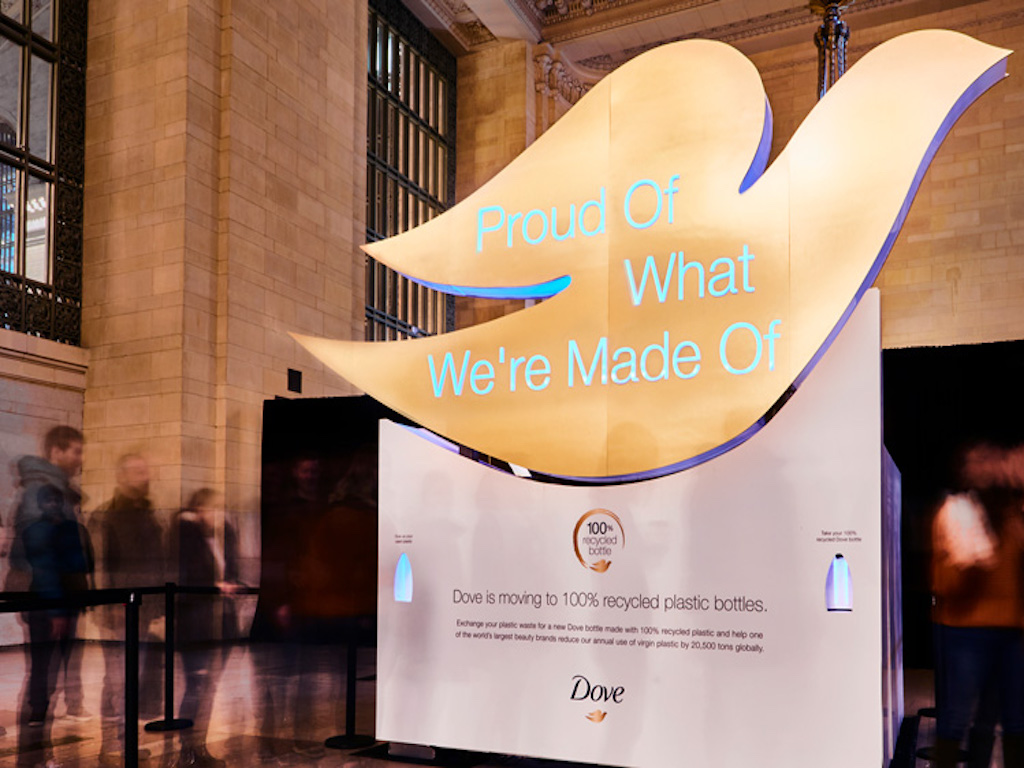3 Mins Read
Personal care giant Dove has recently installed a sustainably-made vending machine in New York City’s Grand Central Station that takes old plastic bottles as payment for body wash, which comes in a 100% recycled plastic container. The day-long initiative is part of its parent company Unilever’s sustainability campaign to ditch virgin plastic packaging. It comes as a slew of corporate giants are taking heed to consumer demand for companies to step up the fight against the global waste and pollution crisis.
Dove, the personal care and hygiene brand under multinational group Unilever, installed a vending machine in New York’s Grand Central Station on the 31st January. Dubbed the “Proud of What We’re Made Of” initiative, the vending machine was designed in partnership with experiential agency New Creatures, and is made from wood and aluminium and powered by renewable energy via a solar battery. Over 2000 visitors during the course of the day deposited their plastic waste to receive a bottle of Dove Body Wash in return, which was packaged in a 100% recycled plastic container. Dove then collected all the donated plastic items for recycling after the event.
“The impact we know we can make to the totality of our environmental footprint is huge. We’re excited to be digging into an area that is important to consumers,” said Amy Stepanian, marketing director at Dove. She added that this was the first time the brand had publicly displayed corporate responsibility centred around plastic waste and sustainability.
While Dove’s stunt to charge people through waste collection isn’t an original idea – the Garbage Café in India has been accepting plastic waste as currency since its inception last year – it is one of the first major global consumer goods brands to implement the concept. Looking ahead, Dove announced that they will be removing all plastic packaging from their Beauty Bar single packs, and is now developing a refillable, stainless steel deodorant stick product.
The public move to encourage recycling is tied to Unilever’s new environmental commitment to halving the use of virgin plastics and shifting to 100% recycled plastics by 2025, which comes as non-profit Break Free From Plastic’s global brand audit revealed that the company is the fifth biggest plastic polluter in the world. According to the company, this will reduce its carbon emissions by over 27,000 tonnes per year and save enough energy to charge 3.4 billion smartphones annually.
Although major corporate brands such as Coca-Cola have remained reluctant to make changes to reduce plastic waste, a slew of well-known companies have indeed realised that they must now cater to the growing numbers of anti-plastic consumers who are concerned about the overwhelming ocean waste, the health impacts of microplastics and overflowing landfills.
Mondelez-owned Cadbury’s, for instance, have recently debuted a plastic-free version of their chocolate bar using 100% paper packaging, while Nestlé Japan announced that they will use recyclable paper packaging for their KitKats that can also be repurposed as origami paper. More recently, sportswear giant Adidas recycled 1.8 million plastic bottles to build an American football field in Miami.
Lead image courtesy of Dove.




